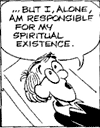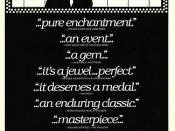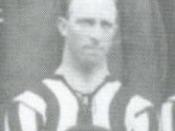The Purple Rose Of Cairo The Purple Rose of Cairo is a story based on how cinema can change lives, but only when the lights are down. In this movie Woody Allen mixes a little romance with intelligence to make a very funny, and in a way deep movie.
The movie starts off by talking about a woman who is hauling her way through the Depression; her name is Cecilia (who is played by Mia Farrow). Cecilia works in a diner while her slobbish husband Monk fritters their money on alcohol and gambling. The sole relief for Cecilia comes when she nudges a few coins across the counter of the local picture house, eager to immerse herself in a celluloid fantasy. Which is the newest release, which mixes socialites and explorers, and Cecilia winds up sitting through it many times. However, during the latest screening her idol Tom Baxter (who is played by Jeff Daniels) halts in the middle of a speech and starts a conversation with Cecilia.
To top that off, Baxter then hops out of the screen and into the audience! The story goes like this, it turns out that Baxter has seen Cecilia so often that he's fallen in love with her, hence his momentous decision to enter the real world. The pair run out of the theatre and into the open, leaving behind them customers and actors who are all stunned. All Baxter wants to do is live a normal life, free from performing the same role all the time. Hiding out in an empty New Jersey fairground, Baxter explains how much he wants to be with her, despite the fact that she's already married. He turns to kiss her, and as it turns out he is such a great kisser that she almost agrees. Back at the Jewel Theatre chaos reigns, with the Manager stranded in the middle trying to figure out what happened. The audience starts complaining, and they say that they want their money back while the actors on screen lounge around, playing cards and squabbling.
Eventually frantic calls reach all the way to Hollywood and into the office of Raoul Hirsch (who is played by Alexander H. Cohen), who is the film's producer. Shocked by the bizarre situation, and cautious of the amount of lawsuits takes a rapid cross-country flight with actor Gil Shepherd (who played Baxter). Now the situation is set to become really complicated, with Baxter and Shepherd in the same town. So far Cecilia has fallen heavily for her fictional friend, wooed by his fake romantic streak and fake optimism. The strange thing is that he only understands the constraints of a movie, which causes problems when it comes to paying real restaurant bills. His fellow actors, tired and grumpy, perk up when Hirsch comes to see them, although their latent selfishness still shines brightly. Inevitably Baxter must be persuaded to return to the film.
The Purple Rose of Cairo contains so many wonderful elements that it seems random to pick out any as special, yet there is one theme which runs strongly throughout the entire film. This is the manner in which common relationships are turned upside-down, most obviously with the transition of Baxter from fiction to a more real type of person. This resonates with the abandoned film cast switching from performing to viewing, as they wait to finish their scene, as well as the flipped relationship of Cecilia and Monk. Perhaps this is Allen's way of indicating that a movie, no matter how frivolous, can have a worthwhile impact on its audience, together with the realization that the real world can never be as perfect as the fictional, and that the reality in the movie is all just a dream.
In the end I enjoyed watching this movie even though I am not always interested in Woody Allen movies. The part at the end which summed up the emotions going on in the movie is the expression of Mia Farrow as she sits absorbed while Astaire and Rogers dance in a series of subtle steps her face transforms from a mask of sorrow to radiant joy, even though the world outside remains as unpleasant as ever.
I believe that the fact that going to a movie, and being so involved in it to the point where you day dream or relate to the characters really shows the reasons why people during the great depression "escaped," so to speak to forget their worries, and relax. I think that this releases some of the happiness that was bottled up inside the second that times got rough. Overall I rate this movie 3 out of 5 stars.







